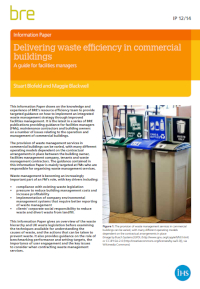Delivering waste efficiency in commercial buildings: A guide for facilities managers
BRE (Building Research Establishment) is an independent, research-based consultancy, testing and training organisation, operating in the built environment and associated industries.
Delivering waste efficiency in commercial buildings: A guide for facilities managers (IP 12/14) was written by Stuart Blofeld and published by BRE on 18 November 2014.
This information paper is part of a series of BRE publications providing guidance for facilities managers, maintenance contractors and building owners about the operation and management of commercial buildings. It provides guidance about how to implement an integrated waste management strategy through improved facilities management and is targeted at facilities managers who are responsible for organising waste management services.
The provision of waste management services in commercial buildings can be varied, with many different operating models dependent on the contractual arrangements in place between the building owner, facilities management company, tenants and waste management contractors.
Waste management is becoming an increasingly important part of a facilities manager’s role, with key drivers including:
- Compliance with existing waste legislation.
- Pressure to reduce building management costs and increase profitability.
- Implementation of company environmental management systems that require better reporting of waste management.
- Client corporate social responsibility to reduce waste and divert waste from landfill.
This information paper provides an overview of the waste hierarchy and UK waste legislation and examines techniques for understanding the causes of waste and the actions that can be taken to prevent waste. It also provides guidance about benchmarking performance, setting targets, the importance of user engagement and key issues when contracting waste management services.
Its contents are:
- UK legislation and the waste hierarchy.
- Gaining an overview.
- Frequency of waste collection.
- Developing a waste prevention plan.
- Benchmarking your waste performance.
- Developing a waste management performance specification.
- Conclusions.
- References.
[edit] Find out more.
[edit] Related articles on Designing Buildings Wiki
- BRE articles on Designing Buildings Wiki.
- BRE Buzz articles on Designing Buildings Wiki.
- BRE Buzz.
- BREEAM Construction waste management.
- BREEAM Operational waste.
- BREEAM Recycled aggregates.
- BREEAM.
- Construction waste.
- Definition of waste: Code of practice.
- Materials Management Plan (MMP).
- Site waste management plan.
- Waste management plan for England.
Featured articles and news
A case study and a warning to would-be developers
Creating four dwellings for people to come home to... after half a century of doing this job, why, oh why, is it so difficult?
Reform of the fire engineering profession
Fire Engineers Advisory Panel: Authoritative Statement, reactions and next steps.
Restoration and renewal of the Palace of Westminster
A complex project of cultural significance from full decant to EMI, opportunities and a potential a way forward.
Apprenticeships and the responsibility we share
Perspectives from the CIOB President as National Apprentice Week comes to a close.
The first line of defence against rain, wind and snow.
Building Safety recap January, 2026
What we missed at the end of last year, and at the start of this...
National Apprenticeship Week 2026, 9-15 Feb
Shining a light on the positive impacts for businesses, their apprentices and the wider economy alike.
Applications and benefits of acoustic flooring
From commercial to retail.
From solid to sprung and ribbed to raised.
Strengthening industry collaboration in Hong Kong
Hong Kong Institute of Construction and The Chartered Institute of Building sign Memorandum of Understanding.
A detailed description from the experts at Cornish Lime.
IHBC planning for growth with corporate plan development
Grow with the Institute by volunteering and CP25 consultation.
Connecting ambition and action for designers and specifiers.
Electrical skills gap deepens as apprenticeship starts fall despite surging demand says ECA.
Built environment bodies deepen joint action on EDI
B.E.Inclusive initiative agree next phase of joint equity, diversity and inclusion (EDI) action plan.
Recognising culture as key to sustainable economic growth
Creative UK Provocation paper: Culture as Growth Infrastructure.
Futurebuild and UK Construction Week London Unite
Creating the UK’s Built Environment Super Event and over 25 other key partnerships.
Welsh and Scottish 2026 elections
Manifestos for the built environment for upcoming same May day elections.
Advancing BIM education with a competency framework
“We don’t need people who can just draw in 3D. We need people who can think in data.”


























